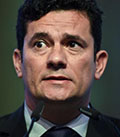
By: James G. Apple, Editor-in-Chief, International
Judicial Monitor
One of the more consistent political issues that has plagued
Brazil over the past decade has been corruption, apparently centered in the
executive branch, but seemingly spilling over into the judicial branch. Judges,
even some at the highest levels, have not been immune from charges of
corruption in their judicial duties.
However, some judges have been and are fighting back at
government corruption.
One ongoing crusading effort to end corruption in the
executive branch, and to bring to justice those government officers who have
been involved in corrupt activities, has been lead by federal judge Sergio Moro
in the city of Curitiba, in Brazil’s southern region.
Judge Moro recently made headlines by overseeing the
criminal corruption case against former Brazilian President Luiz Inacio Lula da
Silva which resulted in a conviction, sending shock waves throughout Brazilian
society. Such a reaction is especially because Mr. da Silva has been one of the most prominent and powerful
political figures in Brazil. Judge Moro has been involved in government and prosecuting government anti
corruption cases for four years. This continuing investigation has been named Lava Jato,
which literally means “car wash.”
Judge Moro was born in 1972 and grew up in Maringa, in the
state of Parana. His parents were teachers. He earned a bachelor of laws degree
in 1995 at Maringa State University, followed by a doctorate at the Federal
University of Parana in 2002. He was early on noted for his sense of justice
and had a reputation of high moral standards, hard work and attention to
detail. Judge Moro received his judicial appointment 1996.

 International
Judicial Monitor
International
Judicial Monitor